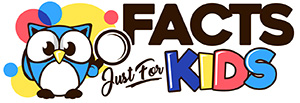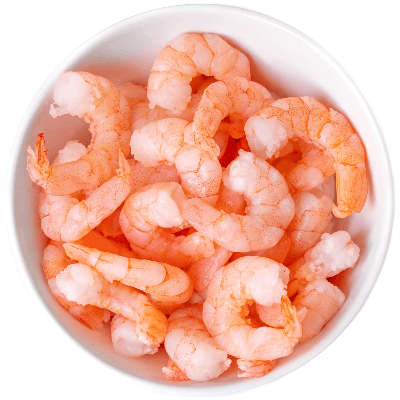
- Name: Shrimp
- Type of Food: Seafood
- Produced From: Decapod crustaceans
- Total Calories: 99 (one serving, 99 grams)
- Total Fat: 0.3 grams (one serving, 99 grams)
- Total Protein: 24 grams (one serving, 99 grams)
- Total Carbohydrates: 0.2 grams (one serving, 99 grams)
25 Shrimp Facts for Kids
- Shrimp is a decapod crustacean that is consumed by humans.
- Shrimp are sometimes called prawns, there is no scientific difference between the word shrimp and prawn.
- It’s estimated that humans have been catching and eating shrimp as far back as 600 AD.
- Shrimp can be eaten raw, baked, boiled, fried, grilled, roasted or steamed.
- Shrimp has lower levels of mercury when compared to other types of popular seafood.
- Shrimp are known for their high levels of omega-3 fatty acids, which is a nutrient that mammals cannot produced themselves and can only obtain it from their diet.
- Shrimp can be caught in the wild or farmed in a shrimp or pawn farm.
- Shrimp are caught in the wild by trawling, using seine nets or shrimp baiting.
- Unfortunately, there is a high rate of bycatch with commercial shrimp fishing. Bycatch is when other species of marine animals are caught in the net being used to catch shrimp.
- Only around 20 species of shrimp out of thousands are commercially fished for human consumption.
- The seven most popular shrimp species commercially fished are the Akamai paste shrimp (Acetes japonicus), banana prawn (Fenneropenaeus merguiensis), fleshy pawn (Fenneropenaeus chinensis), giant tiger prawn (Penaeus monodon), northern prawn (Pandalus borealis), southern rough shrimp (Trachysalambria curvirostris) and the Whiteleg shrimp (Litopenaeus vannamei).
- It’s estimated that average American adult eats 4 pounds of shrimp every year.
- One 100 gram serving of cooked shrimp contains 99 calories.
- One 100 gram serving of cooked shrimp contains less than a gram of fat.
- One 100 gram serving of cooked shrimp contains 189 milligrams of cholesterol.
- One 100 gram serving of cooked shrimp contains 111 milligrams of sodium.
- One 100 gram serving of cooked shrimp contains 295 milligrams of potassium.
- One 100 gram serving of cooked shrimp contains less than a gram of carbohydrates.
- One 100 gram serving of cooked shrimp contains 24 grams of protein.
- One 100 gram serving of cooked shrimp contains 7% of the recommended Daily Value of calcium.
- One 100 gram serving of cooked shrimp contains 2% of the recommended Daily Value of iron.
- One 100 gram serving of cooked shrimp contains 9% of the recommended Daily Value of magnesium.
- Shrimp is a good source of protein. A 100 gram serving of shrimp has almost 50% of the recommended Daily Value of protein.
- A shrimp cocktail is a food dish severed in a glass that contains cold cooked shrimp and cocktail sauce.
- One of the most common allergies is to shellfish and if you have a shellfish allergy you cannot eat shrimp.
Pictures of Shrimp
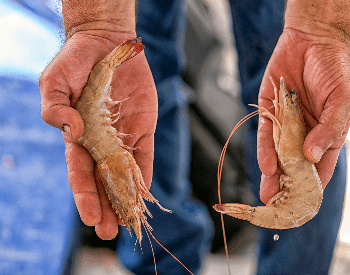
A picture of freshly caught shrimp on a boat.Credit: Ghetty Images
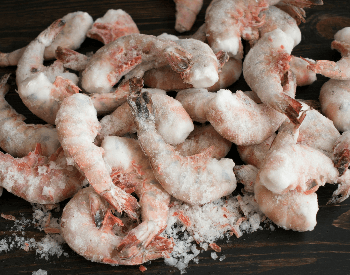
A picture of large frozen raw shrimp on a table.Credit: Ghetty Images
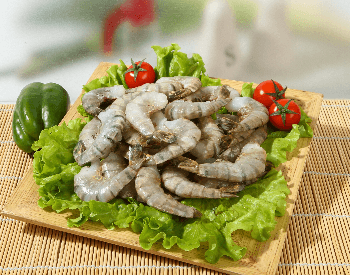
A picture of raw shrimp and sides on a plate.Credit: Ghetty Images
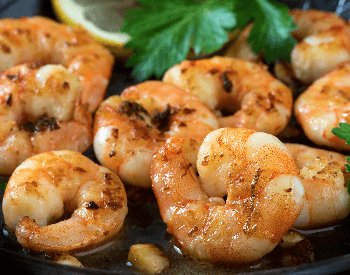
A picture of grilled shrimp.Credit: Ghetty Images
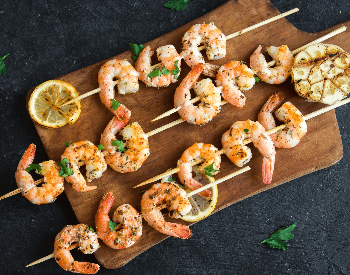
A picture of skwered shrimp.Credit: Ghetty Images
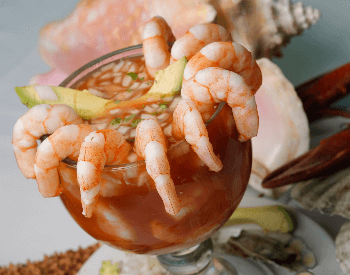
A picture of a shrimp cocktail.Credit: Ghetty Images
Additional Resources on Shrimp
- Shrimp Nutrition Facts – Learn about shrimp’s nutrition facts on the USDA FoodData Central website.
- Facts About Shrimp – Discover more amazing facts about shrimp on the Food Network website.
- Health Benefits of Shrimp – Find out the health benefits of eating shrimp on the Women’s Health Magazine website.
- Shrimp – Wikipedia – Read more about shrimp, its history and production on the Wikipedia website.
